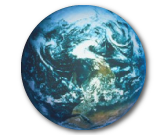While the planet is plunged into a desperate battle to control the spread of COVID-19, it continues to suffer historic catastrophic changes to our climate.
According to a Columbia University report on daily global carbon emissions, carbon dioxide (CO2) levels of 417.1 parts per million in the atmosphere were chronicled in the month of May 2020, reaching their highest monthly average ever recorded.
Regardless of lockdowns around the world to control COVID-19, which prompted huge decreases in transportation and industrial activity resulting in a drop in daily global carbon emissions of 17 percent in April, CO2 levels remained exceedingly high on CO2 analyzers. Reasons, which the public at large may not be aware, are because the carbon dioxide humans have already emitted can remain in the atmosphere for a hundred years; some of it could last tens of thousands of years. Damaging the earth's climate eco-system further is the addition of non-natural carbon emissions to the natural formation of CO2 already present in the atmosphere.
Beyond carbon emissions, COVID-19 resulted in changes in individual behavior and social attitudes, and in responses by governments that will have impacts on the environment and on our ability to combat climate change. For better or worse, these factors are unclear how these actions will balance out in the end, but one thing is certain: an immediate large-scale response will be essential to avoid the worst impacts of climate change which remains untenable.
Political social-economic disagreements and maneuvers in recent past, in addition to strategies combating COVID-19, have delayed a global response to a referendum for action. The Paris Climate Accord of 2015 adopted by "almost" every country, all of which pledged to take action to keep global average temperatures from rising more than 2° C (35.6° F) beyond preindustrial levels, was set to reconvene in November 2020 at COP26. COP26 has been delayed a year. If the conference occurred this fall, countries would likely be more compelled to introduce economic recovery plans for COVID-19 that also further their climate change goals. The delay, however, could enable countries to enact stimulus plans that do not incorporate climate change strategies.
Other international negotiations and conservation conferences have also been postponed and delayed due to having to combat a pandemic. As crucial and vital it is for a world to recover from the dire consequences of COVID-19, these delays could allow some countries to shift their priorities away from the environment. Without participation between governments, the world will suffer catastrophe on two fronts working in tandem to affect earth and its inhabitants in the long term where we see irreversible global temperatures rise above 3° C (37.4° F).
Sources:
https://blogs.ei.columbia.edu/2020/06/25/covid-19-impacts-climate-change/
https://www.the-scientist.com/news-opinion/covid-19-lockdowns-will-have-negligible-effect-on-climate-change-67808
Image by Will J (courtesy of Zumwinkle.com).

